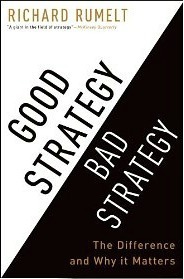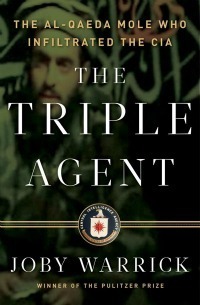Thomas E. Ricks's Blog, page 225
October 17, 2011
The hardest job in Britain?
Q: What do these six people have in common?: Geoff Hoon,
John Reid, Des Browne, John Hutton, Bob Ainsworth, Liam Fox.
A: Over the last six years, all
have served as the British chief of defense.
October 14, 2011
Rumelt on strategy: An interesting new book on how to think about making plans

I don't think business has much to teach us about military
affairs at the tactical level. A major reason for that is a fundamental
difference: In business, you want to cut corners and aim for efficiencies,
because if you fail, you can just declare bankruptcy and start over. But I
think that the military can learn a lot about strategy from the world of
commerce, especially because businesspeople get feedback on their strategy
every day, while military commanders generally can only learn about that if
they go to war.
But I don't mean that military people should run out and buy
the latest bizness buzzword book. Instead, I think they should study people
like Alfred Sloan and Warren Buffett. And I also think they can learn from
people who study business strategy. That's by way of saying I have been reading
and enjoying Richard
Rumelt's Good
Strategy/Bad Strategy.
He is very quotable, so I thought I might as well get out of
the way and let him speak. Here are four things I underlined:
Good strategy almost always looks ... simple and does not
take a thick deck of PowerPoint slides to explain.
The core of strategy work is always the same: discovering
the critical factors in a situation and designing a way of coordinating and
focusing actions to deal with those factors.
Like a quarterback whose only advice to teammates is 'Let's
win,' bad strategy covers up its failure to guide by embracing the language of
broad goals, ambition, vision, and values.
A strategy that fails to define a variety of plausible and
feasible immediate actions is missing a critical component.
Tom again: And that's just from his introduction. More
later.
Joby Warrick's 'Triple Agent'

Joby
Warrick, who used to sit next to me at the Washington Post, has a new book out on the guy who killed a bunch
of CIA operatives in Afghanistan in December 2009. Here is a short interview I
did with him about The
Triple Agent.
Best Defense: There have been a ton of books on
intelligence and al Qaeda over the last several years. What makes yours
different? Why should a hard-working stiff (or one of the many readers of this
blog currently deployed to Afghanistan) pay to download it?
Joby Warrick: Triple Agent is a different kind of read because it is, at its
core, a pure narrative, the story of an intelligence operation that unfolds
over the course of a year and then goes badly wrong. There's a lot of "news" in
the book, including an account of drone warfare that is as detailed, in my
humble opinion, as any in the open-source arena. But the reader is pulled along
by a story that is populated by unforgettable -- but very real -- characters and
races to its tragic climax. For those who closely follow CT, this review by the Brookings Institute's Ben Wittes
wonderfully distills what the book seeks to achieve: a penetrating and
informative reconstruction of a flawed intelligence operation that, to use Ben's
words, "bristles with the energy of a thriller."
BD: Did your research make you more or less pessimistic
about the Afghan war?
JW: I became less pessimistic about the
prospects for defeating "core" al-Qaeda in the Af-Pak region. The CIA's drone
campaign is extraordinarily effective, and the agency is getting progressively
better at targeting senior leaders and disrupting their networks. On the other
hand, my view of the war itself has not changed substantially. After spending
time in the east and meeting with ordinary Afghans there, it's hard to imagine
how a future Afghan government will retain control of provinces such as Khost
or Paktia once U.S. forces are gone.
BD: What has been the unofficial reaction of CIA types to
the book?
JW: I've had wonderful response from
individual CIA officers, including some who served at Khost and were present on
the day of the bombing. Many said they appreciated the book's straight-ahead
approach in telling the story, and the fact that, while pointing out fatal
mistakes that led to the bombing, the book is respectful of ordinary men and
women who served at Khost and worked under extraordinarily challenging
circumstances.
BD: How do you think
the CIA should change?
JW: After the bombing, the CIA owned up
to what then-director Leon Panetta described as "systemic" failures that contributed
to the great loss of life on Dec. 30, 2009. A key failure was an insufficient
focus on counterintelligence, which is an even tougher challenge at a time when
the intelligence agencies and operatives are strained by multiple rotations and
a decade of warfare. There also were mistakes that uniquely reflect the
circumstances and individuals at Khost. The CIA has implemented numerous
reforms, but a challenge for the agency is how to ensure proper attention and
follow-through, given the relative lack of transparency and oversight.
BD: What is the one question you'd like
to answer about the book that nobody has asked you?
JW: Some of the
events in the book have never been described elsewhere, and I've been surprised
that few reviewers or interviewers have asked about them. One favorite: a
description in the book of a dirty-bomb threat that emanated from Pakistan
mid-2009 and raised alarms at the highest levels of the U.S. government.
Information gleaned through SIGINT intercepts suggested strongly that the
Pakistani Taliban (TTP) had acquired "nuclear" material-presumably radioactive
sources useable in a dirty bomb--and were trying to decide what to do with it.
Concerns over a possible dirty-bomb attack directly factored into the decision
to take out TTP leader Baitullah Mehsud, who was killed in a drone strike on
Aug. 5 of that year. No radioactive material was subsequently found, and to
this day, no one knows what happened to it, or indeed, whether it ever existed.
On killing American citizens
I've thought about it. It is going to be necessary
sometimes. But I think I would like to see citizens-turned-foreign terrorists
first stripped of their citizenship.
Meanwhile, speaking of intelligence hits, David Ignatius
reports that the Iranians may have whacked
a Saudi diplomat in Karachi, Pakistan, in May.
Rebecca's War Dog of the Week: South Korea's clone dog army

By Rebecca Frankel
Best Defense chief canine
correspondent
Chase was South Korea's best sniffer dog -- making headlines as a
record-holding service dog until he retired in 2007. Now, Chase's descendants
are in the spotlight for their remarkably keen noses. Which, genetically
speaking, are exact replicas of their "father's" because South Korea is cloning
sniffer dogs. Does anyone else hear the music
Twighlight Zone?
A
scientist by the name of Byeong-Chun Lee successfully cloned a littler of seven
puppies in 2007. Three of those dogs, referred to as "Tomorrow Dogs" and called
"Toppies" for short, are now employed, and
enjoying extremely successful careers with the security team at Customs in the
Incheon International Airport.
One
of those dogs, Tutu, a bounding and very enthusiastic yellow Labrador
Retriever, has been particularly good at his job, holding the record for
detecting "the most drugs" at the airport. He and his handler have been working
together for three years and so far so good. (You can watch CNN's report of the
happy pair here.)
Tutu
and the rest of his cloned siblings are "part of an ongoing study on how
genetic reproductions of prized work animals may revolutionize their use in the
field." Each Toppy is reported to run a price tag of around $100k, which is
tens of thousands more costly than your average bomb-detecting dog but their
rate of success is inordinately high: "Incheon security estimates that about 30
percent of their dogs are able to be used ... every single cloned dog
passed the test to become a drug-sniffer..."
I'd
be curious what handlers think about this new development and whether or not
the U.S. military should follow suit and clone IED detection dogs (if it hasn't
already). We're already
genetically "enhancing" dogs' olfactory abilities. But where do we draw the
line? Dr. Lee and his team have also done work cloning
endangered species like grey wolves. That seems worthwhile, but what about glow-in-the-dark
dogs? FP's own Josh Keating reported in 2009,
scientists at Seoul National University have already done that.
Okay,
now cue the music.
Hat
Tip: Dimitry.
October 13, 2011
Steve Jobs and strategy: Sometimes the important thing is what he didn't do

Richard Rumelt, an expert on business strategy
whose book I am reading, on his website provides an
interesting list of what Steve Jobs did not
do at Apple:
Many people and companies want to emulate Apple
and study what the company has done. I believe that in trying to learn from
Steve Jobs and Apple it is very useful to pay attention to what he did not do.
In compiling this short list, I have used ideas and phrases in common use by
managers and business consultants:
He did not "drive business
success by a relentless focus on performance metrics." Success came to
Apple by having successful products and strategies, not by chasing
metrics.
He did not "motivate high
performance by tying incentives to key strategic success factors." Apple
did not run a decentralized system based on pressuring individuals to
deliver targeted business results.
He did not have a strategy "built
through participation by all levels to achieve a consensus which resolves
key differences in perspectives and values." Strategy at Apple is
essentially driven from the top.
He did not waste time on the
delicate distinctions among "missions," "visions," and "strategies."
He did not use acquisitions
to hit "strategic growth goals." Growth was the outcome of successful
product development and accompanying business strategies.
He did not seek to engineer
higher margins by chasing rust-belt concepts of "economies of scale." He
left such antics to HP
In his book,
by contrast, Rumelt offers on page 259 a handy list of what Jobs did do:
(1) imagine a product that is 'insanely great,'
(2) assemble a small team of the very best
engineers and designers in the world,
(3) make
the product visually stunning and easy to use, pouring innovation into the user
interface,
(4) tell the world how cool and trendy the
product is with innovative advertising.
Tom again: Meanwhile,
I was struck by another observer's less astute supposed
example of Jobs' toxic leadership. In fact, what Jobs did strikes me as
simply enforcing accountability -- which is what leaders should do:
"Can anyone tell me what
MobileMe is supposed to do?" Having received a satisfactory answer, he
continued, "So why the fuck doesn't it do that?"
"You've
tarnished Apple's reputation," he told them. "You should hate each
other for having let each other down."
Jobs
ended by replacing the head of the group, on the spot.
A major asks: Now that we have gay soldiers, what about the guys who said this move would destroy the military?

A Best Defender who is a major on
active duty writes to ask:
At what point in time should journalists,
bloggers, etc ... hold those who made wildly inaccurate predications on the
lifting of the ban accountable? All the retired generals and officers (LTG
Mixon, Merrill A. McPeak and Col. Dave Bedey for example) who predicted that
soldiers would leave the military by the thousands, or John McCain and other
politicians describing how it would affect us as a fighting force? At some
point I feel that the public should be reminded of their predictions so the
next time they make predictions that are way off the mark, fewer people will
give them credence.
2 minds on the Iranian assassination plot

I don't know what to believe. Juan Cole makes a pretty good case that the
facts of the matter make it look like it was not really run by the Iranian
government, mainly because of the sloppiness of the accused, which is said to
be uncharacteristic of Iranian overseas operations. On the other hand, one thing
I learned in two decades as a reporter was never to underestimate the potential
of people to screw up, especially large organizations. I mean, who would have
believed that people in the White House would hire a bunch of semi-competent "third-rate"
thugs to break into
the Democratic Party's national offices?
October 12, 2011
Defense spending as a job creator: The last refuge of today's defense lobbyists
The last refuge of
defense lobbyists isn't patriotism, it is arguing that defense spending means
jobs. Here's a quote
from yesterday's Boston Globe:
'When people
are polled right now, what's their number one issue? Jobs and the economy.
Defense and homeland security and terrorism are polling very, very low,' said
Michael H. Herson, a lobbyist whose firm's clients include Raytheon Co., the
defense titan based in Waltham. 'So how do you make this issue resonate? You
talk about jobs.'
The problem with
that approach is that defense spending resembles consumption more than
investment -- once the money is spent, it is gone. Probably half the bridges we
drive over were built during the Depression, but no one, except maybe some rear
echelon Taliban, is using weapons bought then. So if the worry is how to use
federal spending to create or preserve jobs, the best way to do that is to spend
on infrastructure building -- roads, bridges, schools, hospitals. These all pay
additional benefits. And as Joe Nocera pointed
out in yesterday's New York Times,
the ingredients (labor, capital and equipment) are all readily available at
historically low prices.
McCaffrey (II): Develop a simple plan, empower people, hold 'em accountable

Another excerpt from the auftrag-tastic oral history of Gen. Barry
McCaffrey:
One of the things I strongly
believe is that being a brigade commander or division commander has a lot of
similarities to being a good company commander: Have a simple plan, articulate
it early, give people authority, hold them accountable.
(p. 54)
Thomas E. Ricks's Blog
- Thomas E. Ricks's profile
- 436 followers



